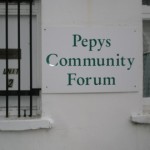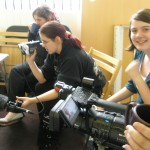Below there is an article published in Jan 2007 in the Daily Mail claiming that students of Bacon college see Jade Goody as their ultimate role model. Hannah Rumney, a student at Bacon College, argued at Spectacles Poverty and the Media workshop that this was completely untrue. Filled with shady characters who are supposed to represent ‘students’ and slang Hannah has never heard of, like ‘Kippered’, Hannah calls into question the authenticity of the articles interviewees. Read the article below and let us know what you think. What does Kippered mean?
Where Jade will always be a winner
Last updated at 08:50 31 January 2007
The streets went from cold and empty to full. And it took one minute. Now the silent park was a place filled with noise. Here come the kids out of Bacon’s College, Rotherhithe, South-East London.
Their faces were mostly deep inside sinister hoods and they were arguing all the way along the pavement. Jade walked home this way. Bacon’s was her school. She learned a lot in there. How to become a millionaire was the best.
She almost certainly could get herself defined as a moron. Look the word up. She qualifies.
Intelligence is not called for in the world of celebrity. Two other women with her on that ignorant show were halfwits.
No one walking out of Bacon’s towards the Surrey Quays shopping centre was in school with Jade. This one tall young pupil said all he heard of her until two weeks ago was that she bit a classmate’s ear.
He was with a group, two guys and three girls, going to Burger King. His mother had given him money for his tea.
If he didn’t get a burger, he would often go across to The Blue Market in Bermondsey and get chips.
Everybody knew their way around the shopping centre, every inch and doorway. That was so they could lose the police and community officers who went there chasing truants.
What about Jade, this lot was asked. “She’s the best,” the tall guy said.
But she left your school only vaguely knowing right from left.
“Yeah, well, it’s easy to get bored. She had other things to do.”
Like what?
Then they all threw in some fantasy. A good one was Jade bought a Rolls-Royce and was going to give lifts home to the ones from the old school who lived furthest away.
Jade didn’t know where East Anglia or Birmingham was, they were told.
The group said nothing. Any of you know, you asked them?
“It’s outside London somewheres,” the girl with dyed blonde hair said. “A long way. Up Manchester way somewheres.”
Is that North or South?
“Somewheres like that,” she said.
Anyone else know?
“It’s by the sea.” This was one of the guys.
Which sea? “The England Sea or something.”
A girl, 15, moody so far, opened up. “I been there in my father’s van. It sort of up there.”
She drew her finger through the air as if she was pointing at a map. The direction would have got her in the proper area and maybe earned half-marks. That’s sensational around here.
If East Anglia had been on TV, they would each have been in the zone. TV is the great teacher of children in these kind of places. All life is around it.
A kid thinks you dial 911 for an ambulance. It’s the American number. That’s the one they hear on the U.S. TV series being watched until midnight, even later.
Do people talk much about Jade in Bacon’s?
“Oh yeah, she’s from us, ain’t she. Done very good for herself.” The oldest-looking boy said that. The girls were with him.
Would you rather be like her or be a doctor? The blonde didn’t have to think about it.
“Like Jade, definite. She’ve got all them clothes and cars and things.”
She is a great big dope as well, the girl was told. That would not be too hard to handle, she thought, especially if you put £3 million in her bank account.
Two women, grey-haired, were drinking tea and cracking biscuits in a cafe near Burger King.
“We saw you talking to those kids outside,” one of them said. I was finding out what they thought of Jade, you said.
“Bloody well ask me,” the woman said. “I went to school down Galleywall in Bermondsey,” she was proud to say.
“During the war. Hardly any men teachers. A few old ones, that’s all. You had to learn in those days. There wasn’t one child came away without knowing a thing or two. English, geography, arithmetic.
“Today, well I can’t tell you if they know right from left.”
Then you said that was exactly what you told the Bacon’s pupils.
“They’re the same as all the others. Is it the teachers, the kids? I don’t have a clue. Something’s gone wrong.”
She had a granddaughter.
She was taken out of one school and put in another.
This was in Kent. She was so bright, her grandmother said, kids in the first school were holding her back. Now she was fine.
“Imagine if she had been in with that Jade creature. I’d bet if you could trace the other kids from her class most of them came out more or less the same, total idiots.”
Had you heard of Jade before?
“A little bit. No one was proud of her, I think. Her ignorance was shameful, not funny. There’s a good amount of it in these parts.”
The woman went back to her coffee and a nearly finished crossword in the Evening Standard. Late stragglers from the school were in Timber Pond Road. Smoke from some cigarettes floated away into the freezing evening.
I’ve been asking about Jade, you said to anyone who would listen.
“She been f****** done over,” a boy said. The words came from inside a hood that was almost a mask over his face.
“Yeah, f****** kippered up,” another one got in.
I was going to ask them where was East Anglia? It was better left until next time.


